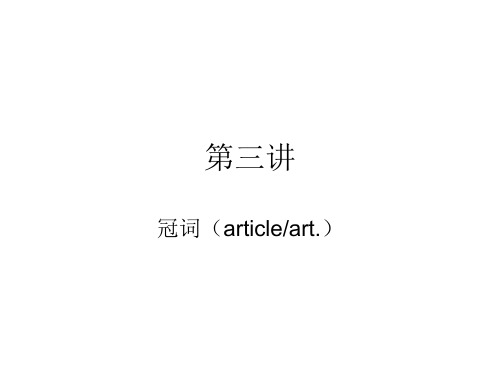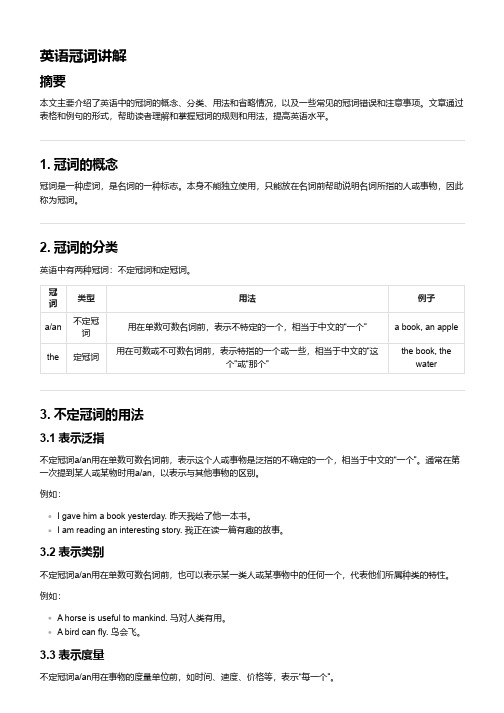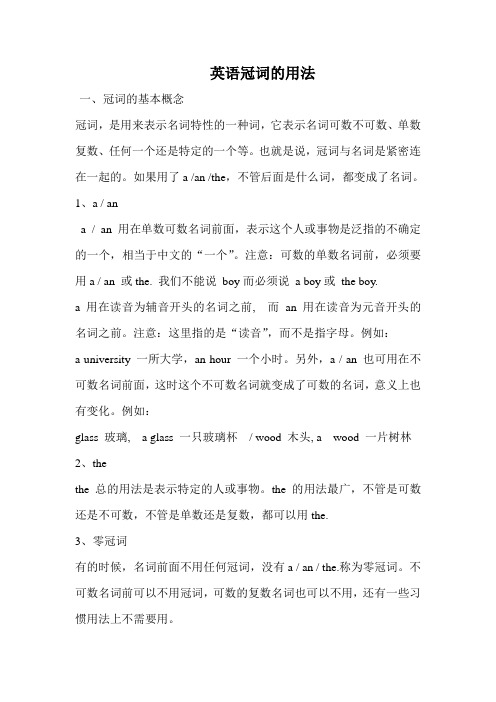冠词
冠词的用法及其特殊情况

冠词的用法及其特殊情况冠词是英语中一类非常重要的词汇,在句子中起到限定名词的作用。
冠词分为定冠词(the)和不定冠词(a/an)。
本文将重点讨论冠词的用法,并探讨一些特殊情况下的冠词用法。
一、定冠词的用法定冠词“the”用于特指一个或多个已知的人或物。
其用法如下:1. 特指特定的人或物:the book(那本书),the dog(那条狗)。
2. 特指独一无二的事物:the sun(太阳),the moon(月亮)。
3. 特指某类人或物的整体:the rich(富人们),the poor(穷人们)。
4. 特指前文中提到过的人或物:I saw a dog. The dog was white.(我看到了一只狗。
那只狗是白色的。
)二、不定冠词的用法不定冠词“a/an”用于泛指一个人或物。
其用法如下:1. 泛指单数名词:a book(一本书),an apple(一个苹果)。
2. 泛指某类人或物:A cat is a mammal.(猫是哺乳动物。
)3. 泛指某个成员:He's an engineer.(他是一名工程师。
)三、特殊情况下的冠词用法1. 用于专有名词:the Great Wall(长城),the United States(美国)。
2. 用于地理名称:the Pacific Ocean(太平洋),the Alps(阿尔卑斯山)。
3. 用于乐器名称:He can play the piano.(他会弹钢琴。
)4. 用于某些固定短语中:in the morning(早上),at the moment(此刻)。
特殊情况下的冠词用法需要我们具体的语境来判断,建议在学习过程中多读多练,熟悉习惯用法。
四、常见错误用法1. 不必要使用冠词:I love playing basketball(我喜欢打篮球)。
2. 不应使用冠词:She is teacher(她是老师)。
3. 缺少冠词:He wants to be doctor(他想当医生)。
冠词的分类和用法

• 5. 用于序数词前
• e.g.: the first one, the second one, etc. • 6. 用于形容词最高级前
• e.g.: Autumn is the best season here. • 7. 用于表示方位(东、西、南、北、中、左、右)的
名词前
• e.g.: Tianjin is in the east of China. • 但 from east to west 之类的结构除外 • 8. 用于某些江、河、湖、海、山川、海湾、沙漠前
• 14.church, school, hospital, prison, university 等单数 可数名词指机构(institution)时,其前常不用冠词; 如果不指机构而指一座具体建筑(building),其前 又常用冠词。
• e.g.: They go to church every Sunday morning.(上 教堂)
• 4. 学科、语言、(医学中)大部分疾病名、某 些报刊名前
• e.g.: chemistry, English, High blood pressure, China
Daily
• 5. 季节、月份、星期、节日前,一般不加冠词, 但有限定性定语修饰, 或表示一特定的时间时, 就要加定冠词
• e.g.: School begins in September.
• 12.用于演奏的乐器、文娱艺术活动等名称前
• e.g.: play (the piano, the violin, the flute),
• go to (the cinema,, the theatre, the movies, the concert)
• 13.用于逢十的复数数词之前,指世纪的某个年代
英语冠词

• It was too good a chance to be missed. 这是个好机会, 不能错过。
• I know how great a labour he had undertaken. 我知道他 从事的是多么艰巨的劳动。
冠词的用法2
• 2.在复形可数名词前可用定冠词或零冠词。如: • The stars were bright in a cloudless sky. 天空
无云,群星灿烂。(定冠词表特指) • Cigarettes are bad for your health. 香烟有害于
你的健康。(零冠词表类指) • 3.不可数名词前可用定冠词或零冠词。如:
me to a party. 苏珊来信邀我参加聚会。 • 然而,由于名词的数形和数念都有不少特
殊情况,以及历史、习惯等原因,在英语 实践中, 三种冠词几乎可用于各类名词。
冠词的位置1
• 冠词与名词连用,总是置于名词之前。如: • The potato is a vegetable, not a fruit. 土豆是一
• It is rather a pity. 这是相当令人遗憾的。 • He lived in rather a lonely part of the country. 他住在乡
村一个相当僻静的地方。 • quite 和 rather 置于不定冠词之后,其语气则较弱。如: • That’s a quite surprising result. 这种结果有些令人吃惊。 • He’s a rather hard man. 他是个颇为严厉的人。
英语常用50个冠词

英语常用50个冠词英语中的冠词分为不定冠词和定冠词两种。
不定冠词指的是"a"和"an",定冠词指的是"the"。
以下是英语中最常用的冠词。
不定冠词aan不定冠词用于表示不确定的数量或身份,通常用于单数可数名词前。
例如:"I saw a bird in the tree."a fewa little"a few"和"a little"都表示数量的少量,但"a few"用于可数名词,而"a little"用于不可数名词。
例如:"I have a few books to read"和"I have a little time to spare."any"any"通常用于疑问句、否定句和条件句中,表示任何一个或任何数量。
例如:"Do you have any brothers or sisters?"和"I don't have any money."another"another"表示另一个,通常用于可数名词前。
例如:"Can I have another cup of coffee?"certain"certain"表示特定的、确定的,通常用于不可数名词前。
例如:"I have certain information that you might find interesting."each"each"表示每一个,通常用于可数名词前。
例如:"Each student must submit their own project."either"either"表示两者中的任意一个,通常用于疑问句和否定句中。
英语冠词讲解

英语冠词讲解摘要本文主要介绍了英语中的冠词的概念、分类、用法和省略情况,以及一些常见的冠词错误和注意事项。
文章通过表格和例句的形式,帮助读者理解和掌握冠词的规则和用法,提高英语水平。
1. 冠词的概念冠词是一种虚词,是名词的一种标志。
本身不能独立使用,只能放在名词前帮助说明名词所指的人或事物,因此称为冠词。
2. 冠词的分类英语中有两种冠词:不定冠词和定冠词。
冠词类型用法例子a/an 不定冠词用在单数可数名词前,表示不特定的一个,相当于中文的“一个” a book, an applethe定冠词用在可数或不可数名词前,表示特指的一个或一些,相当于中文的“这个”或“那个”the book, thewater3. 不定冠词的用法3.1 表示泛指不定冠词a/an用在单数可数名词前,表示这个人或事物是泛指的不确定的一个,相当于中文的“一个”。
通常在第一次提到某人或某物时用a/an,以表示与其他事物的区别。
例如:I gave him a book yesterday. 昨天我给了他一本书。
I am reading an interesting story. 我正在读一篇有趣的故事。
3.2 表示类别不定冠词a/an用在单数可数名词前,也可以表示某一类人或某事物中的任何一个,代表他们所属种类的特性。
例如:A horse is useful to mankind. 马对人类有用。
A bird can fly. 鸟会飞。
3.3 表示度量不定冠词a/an用在事物的度量单位前,如时间、速度、价格等,表示“每一个”。
例如:We often go to school two times a day. 我们经常一天去学校两次。
I went to the library once a week at least. 我至少每周去图书馆一次。
3.4 表示泛指不定冠词a/an用来泛指某人、某物或地方。
例如:A boy came to see you a moment ago. 刚才有个男孩来找你。
英语语法冠词

二、冠词冠词是印欧语系和闪含语系的诸语中,位于名词或名词词组之前或之后,在句子里主要是对名词起限定作用的词。
冠词是一种虚词。
在汉语,日语等语言中没有与之相对应的词性。
不定冠词表示泛指、类指,定冠词表示特指、专指、类指,零冠词表示泛指人或事物、类指。
a、an,仅用在单数可数名词前来表示“一”的意义,但不强调数目概念,只表示名词为不特定者。
定冠词the,表示名词的特定者,表示“这”·“那”·“这些”·“那些”,用在可数名词单数、复数,不可数名词前均可。
(/)则表示名词化的其他词或专有名词,因此单数复数均可。
复数可数名词和不可数名词前不用冠词,也表泛指,有些语法专家称之为“零冠词”。
⑴定冠词的用法定冠词:the 表特指1、表示上文提到过的人或事物。
第一次提到用a或an,以后再次提到用the。
如:FuJianshu have bought a book. The book is very useful.2、用以特指某(些)人或某(些)事物,This is the house where Mr Zhang once lived .3、用于说话人与听话人心中都有数的人或事物。
如:Close the window, please.4、用于表示世界上独一无二的事物前。
如:the sun, the moon, the earth, the world 等。
5、用于表示方位的名词之前。
如:in the east, on the right.,at the back ,in the front6、用于序数词或形容词的最高级之前。
如:the first, the tallest.7、用于形容词之前,使其名词化。
代表一类人或物。
如:the sick, the wounded.,the good ,the beautiful8、用于由普通名词构成的专有名词之前。
如:the United States, the United Nation. ,the Great Wall ,The West Lake9、用于江河、海洋、海峡、山脉、群岛、建筑物等的名词之前。
冠词的用法

英语冠词的用法一、冠词的基本概念冠词,是用来表示名词特性的一种词,它表示名词可数不可数、单数复数、任何一个还是特定的一个等。
也就是说,冠词与名词是紧密连在一起的。
如果用了a /an /the,不管后面是什么词,都变成了名词。
1、a / ana / an 用在单数可数名词前面,表示这个人或事物是泛指的不确定的一个,相当于中文的“一个”。
注意:可数的单数名词前,必须要用a / an 或the. 我们不能说boy而必须说a boy或the boy.a 用在读音为辅音开头的名词之前, 而an 用在读音为元音开头的名词之前。
注意:这里指的是“读音”,而不是指字母。
例如:a university 一所大学,an hour 一个小时。
另外,a / an 也可用在不可数名词前面,这时这个不可数名词就变成了可数的名词,意义上也有变化。
例如:glass 玻璃, a glass 一只玻璃杯/ wood 木头, a wood 一片树林2、thethe总的用法是表示特定的人或事物。
the 的用法最广,不管是可数还是不可数,不管是单数还是复数,都可以用the.3、零冠词有的时候,名词前面不用任何冠词,没有a / an / the.称为零冠词。
不可数名词前可以不用冠词,可数的复数名词也可以不用,还有一些习惯用法上不需要用。
二、不定冠词的用法:1、表示某一类人或某事物中的任何一个, 在第一次提到时用a / an,以表示与其他事物的区别。
I gave him a book yesterday. 我昨天给了他一本书。
I have got a ticket. 我有一张票。
2、代表名词所属别类。
A boy is flying a kite.一个男孩在放风筝。
A bird can fly. 鸟会飞。
3、用在事物的度量单位前, 如时间、速度、价格等, 表示"每一个"。
He often goes to school two times a week. 他一周去学校两次。
英语冠词的用法总结

英语冠词的用法总结1500字冠词是英语中一种重要的词类,用于限定名词的意思或范围。
英语中主要有三种冠词:定冠词(the)、不定冠词(a,an)和零冠词(即没有冠词)。
冠词的正确使用对于理解和表达英语句子的意思非常重要。
以下是关于英语冠词的用法总结。
一、定冠词(the)1. 特指某一个人或物例如:The book on the table is mine.这张桌子上的书是我的。
2. 特指上文提到过的人或物例如:I saw a cat in the street. The cat was black and white.我在街上看到一只猫。
那只猫是黑白色的。
3. 特指特定的事物或一类事物例如:The sun rises in the east.太阳从东方升起。
4. 在表示乐器或方向时例如:She plays the piano very well.她演奏钢琴很好。
5. 在表示固定概念时例如:The Earth revolves around the sun.地球绕着太阳转。
6. 在表示某些独一无二的事物时例如:the sky,the sun,the moon天空、太阳、月亮7. 在表示复数名词中例如:The students are studying for the exam. 学生们正在为考试复习。
二、不定冠词(a,an)1. 表示泛指或任意人或物例如:I need a pen.我需要一支笔。
2. 在表示职业或国别时例如:He is a doctor.他是一个医生。
3. 在表示数量或单位时例如:It costs three dollars a kilo.一公斤要三美元。
4. 在表示频率或速度时例如:He drives at 100 miles an hour.他以每小时100英里的速度驾车。
三、零冠词1. 表示一般概念、抽象名词和名词作主语时例如:Books are my best friends.书是我的最好的朋友。
- 1、下载文档前请自行甄别文档内容的完整性,平台不提供额外的编辑、内容补充、找答案等附加服务。
- 2、"仅部分预览"的文档,不可在线预览部分如存在完整性等问题,可反馈申请退款(可完整预览的文档不适用该条件!)。
- 3、如文档侵犯您的权益,请联系客服反馈,我们会尽快为您处理(人工客服工作时间:9:00-18:30)。
不定冠词“a”和“an” 的用法1、泛指一类人和物。
相当于any.e.g. A horse is a useful animal. / A steel worker makes steel.2、表示one 或every,e.g. I have a mouth ,a nose and two ears.3、用于一些固定词组中.e.g. a little/ a bit/ a couple of/ in a hurry/ have a cold4、用在quite, rather, many, half /what/such 等词后.eg.1 Many a boy is swimming. 2 The village is half an hour’s walk from here.5、用在so(as/too/how etc.) +形容词之后eg. How interesting a film it is! (How interesting the film is!)He is not so /as good a driver as you.6、用a/an + 抽象名词,表示“一件… 的事“一个….的人”eg.1 He is a success. 2 The plan is failure. 3 It’s a pleasure.7、用a/an表示部分不可数名词,表示“一点”,“一些”等。
a smile一丝微笑 a rain一场雨make a noise 制造一点噪音8. 表不确定的“某人”或“某物”,意为a certain.e.g.. A Mr. Lin is waiting for you.定冠词的用法1、表示特定的或上文已提到的人或物。
Eg.1 How did you like the report? 2 I borrowed a book yesterday. The book is every interesting.2、表示世界上独一无二的东西。
Eg. The sun is the centre of the world.3、表示江河,山川群岛,海峡海湾及国家,党派的名称是由几个普通名词构成的专有名词时,通常用the.eg. the Dead Sea the People’s Republic of Chinathe English the French etc.4. 定冠词+姓氏复数,表示夫妇或一家人。
eg. The Smiths the Turners5、演奏的乐器名称前加定冠词.(西方乐器)eg. Play the piano play the flute6、用在方位名词前或某些表示时间的词组或惯用语中.eg. On the left (right) in the west in the end in the morning 7、某些形容词前加the 表示一类人或物,谓语动词用复数。
eg.1 The rich become richer,the poor poorer.2 The beautiful is always loved.3 The Chinese are working hard.8、用在单数名词前,表示一类人或一类物。
eg. The horse is a useful animal.9、用在序数词前,形容词的最高级前及表示俩者之间的比较中的“较…… 者”之前.eg.1 the longest river the third lesson2 He is taller of the two.10、表示“几十年代或年龄” 之前。
Eg. In the 1870s the 90’s in his forties11、表示发明物的名词词前.Eg. Alexander Graham Bell invented the phone in 1876(NMET91)不用冠词的情况1.抽象名词,物质名词,单个专有名词,人名,地名等前,一般不用冠词。
eg. What they need is water. / Failure is the mother of success./ China , Tom, Shangdong Province.2.球类、棋类运动前都不加冠词: play chess / play football3.名词前有物主代词,指示代词,不定代词,名词所有格等限制时不加冠词。
如:eg. This is my book.4.三餐前不加冠词,但特指须加,有时也可以加a 表示一顿。
eg.1 What do you usually have for lunch?2 We had a really good dinner.3 The lunch with him yesterday was unforgettable.5.四季前一般不加the。
但特指必须加the。
eg. 1 It is very cold in(the) winter in this part of China.2 Summer comes after spring and before autumn.6.表示独一无二头衔,职位名词在句中做宾补,表语, 主补以及同位语时,大都用零冠词。
eg. He was made monitor only yesterday.7.当bike,car,taxi,bus,train,ship等与介词by连用,表示一种交通手段时,不用the。
eg. Did you come back byu plane or by train?还有by water,by land,by sea,by air,on foot,on horse back 以及by telephone,by telegraph等但take a bus,on the bike,in a boat等需加冠词。
8.表示语言的名词前一般不用冠词。
eg.Chinese,English, French, 但用language时需加the: 如: the Chinese language9、在含有day的节日、假日前,不用冠词:Children’s Day ,但在含有festival的节日前,需加冠词the Spring Festival; the Mid –autumn Festival.10.在某些词组中,用不用冠词,所表示的含义不同。
如:go to school (上学) go to the school(到学校去)in hospital (住院) in the hospital (在医院里面)in front of (在……前面) in the front of (在……的前部)a/an与one 的异同1. a/an不和two, three对比,one 可以。
如:My sister has three pens, but I have one pen.2. 有些惯用语中不可互换,如:one day, once upon a time, an hour or two, one or two hours3. 有些词语里a/an 和one的意思不同。
more than a year/more than one yearat a time/at one time具体情况下的冠词之有无:●餐名的前面通常没有冠词,但“形容词+餐名”或“餐名+ 短语或定语从句”之前,以及“喜筵、庆祝宴等等的前面,要加冠词。
如: I found them at breakfast.Did you go to the dinner given by Mr. Wang?●四季的前面通常没有the,in后面有无the均可。
如有定语的则必须要加the .In our part of the world, summer is the hottest.The farmers plants his seeds in (the) spring.We spent the winter of 1999 in the south.●class, school, college, university, church, hospital, prison, court, market, bed, table, sea等名词被用作目的时,没有冠词,如果这些名词表示场所或建筑物本身,需要冠词。
如:They were taken to prison for stealing.There is a prison at the back of my house.go to sea/go to the seaat market/at the market●Home指说话者的家且没有修饰语时,没有冠词。
如果有修饰语,需要冠词。
Is anybody at home?We arrived at the bride’s home early in the morning.For some years this was an orphan’s home.●town 指说话者或主语在其居住的城市里所从事的活动时通常不加冠词。
在live in后要有冠词。
We go to town sometimes to do some shopping.I’m going down town this afternoon.Would you rather live in a town or in the country?●Work/office都可作“工作的地方”讲,但前者没有冠词而后者有。
He is on his way to work.He’s at the office now.●east/west/south/north, left/right, present/ past/ future 等用作名词时有the,用作副词时没有。
Turn your face to the east.The birds fly south in the spring and north in the fall.●by和计量单位名词之间要有the.by the dozen, by the pound, by the hour, by the week●by 后面的交通工具或交通方式后面不要冠词。
by train, by sea, by mail, by taxi, by water, by telephone, by letter●by day, by night, by daylight, at night里都没有冠词。
●乐器名称之前有the,球类以及有规则的游戏名称之前无冠词。
play chess, play the violin, play the pianoHe’s interested in golf.●疾病之前通常没有冠词。
